Original title: Chen Lihua’s past
Source: China Entrepreneur Magazine.
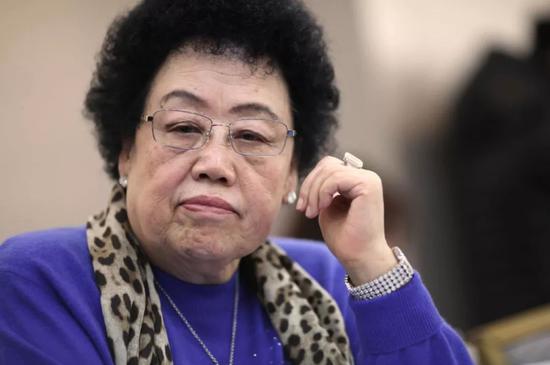
With a net worth of nearly 40 billion yuan, the 78-year-old legendary female rich in China actually only loved the Beijing Gate and rosewood in her later years.
In China’s billionaire circle, Chen Lihua is a name that cannot be ignored.
On January 21st, Forbes China released the list of the richest women in 2019, and Chen Lihua, Chairman of the Board of Directors of Fuhua International Group, ranked third, with a net worth of 39.15 billion yuan. Among the rich women with an average age of 53, her 78-year-old age is particularly noticeable. As early as 2016, she became the richest woman in China for the first time with a wealth of 50.5 billion yuan. In 2010, she was selected into Hurun’s list of the richest women in China, ranking fourth with a net worth of $4 billion.
Although her wealth has shrunk slightly compared with the past few years, she is still a legendary businesswoman. She not only created Chang ‘an Club, Jinbao Street and other projects, but also attracted much attention because of her love story with Zhongrui Chi, the Tang Priest. Now, at the age of 80, she has handed over the core business of real estate to her son to take care of, and she and her husband are focusing on the art of rosewood collection.
Beijing natives, transformed into real estate queens.
According to Chen Lihua’s own disclosure, she was born in the Summer Palace, the eighth descendant of Yehenala, the Manchu nationality. But she was not a lucky "Gege", and her family was poor, so she dropped out of high school.
From the descendants of declining aristocrats to the richest woman in China, there is little disclosure about Chen Lihua’s road to prosperity, and there are many versions circulating.
One theory is to speculate in real estate in Hong Kong. In 1982, Chen Lihua moved to Hong Kong and dug up the first bucket of gold. She bought 12 villas in Beverly Hills and sold them at a high price, quickly completing the original accumulation.
Another view is that Chen Lihua’s capital empire, which comes from selling furniture and cultural relics, began with the cultural relics left over from the Cultural Revolution. In her early years, she worked in a sewing society. After the reform of public-private partnership, she became a sewing self-employed. She once revealed that when she was young, her family came down, and she worked around the clock, making clothes for others at night and taking care of children during the day.
在街坊的印象里,陈丽华最大的特点是豪爽。她教育子女,从小不要占别人便宜,但别人不占她便宜她还不高兴,“这么好的东西给你不要,是看不起我”。她为人仗义,结识了很多朋友,掌握了很多信息。
80年代中期,她了解到,北京的龙顺城中式家具厂里,保藏有大量文革中得来的珍贵明清紫檀、金丝楠和黄花梨木家具,在当时,这些都是“无主”之物。
陈丽华通过关系,以较低的价格得到了其中的一部分。随后,她通过那个年代常见的亲戚介绍信和律师证明,移民到了香港,并且创办香港富华,主营地产交易,收获颇丰。
90年代初期,陈丽华拿到了临近天安门广场的一块地皮,兴建长安大厦。“那时候长安俱乐部是一个球场”,她是作为港商招商引资进入内地的。
从这个动作来看,陈丽华的能量非同小可。
因为毗邻紫禁城,与天安门广场一墙之隔,这块地的政治敏感度很高。适逢北京主办亚运会,政府对项目的审批格外严格。陈丽华等了4年,才得到相关部门首肯。期间,很多朋友都劝她别做了,成不了。
手续办成的当天夜里,她就带着4辆汽车的人开始干活,因为项目位置,白天不能施工,只能晚上建设。陈丽华天天跑工地,昼伏夜出,偶尔还把自己当工人使。
这个工程让她愈发重视人脉关系的重要性,项目落成后,她将大厦的6层划出,成立了长安俱乐部。
长安俱乐部位于天安门广场沿长安街东行500米, 占据得天独厚的地理位置。长安俱乐部首开京城富豪俱乐部之先河,是京城四大顶级会所之一,李嘉诚、郑裕彤、郭炳湘均名列长安俱乐部理事会成员。
一进入长安俱乐部大门,便是“屏风·宝座”,通体金箔,灼灼逼人。据称,它由中国紫檀博物馆出品,按故宫乾清宫龙椅比例制作。旁侧的“紫檀如意”与其相呼应。
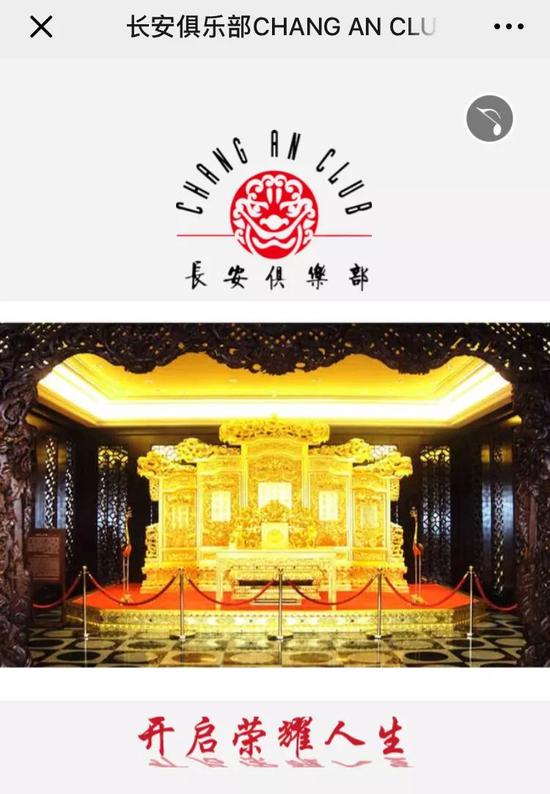
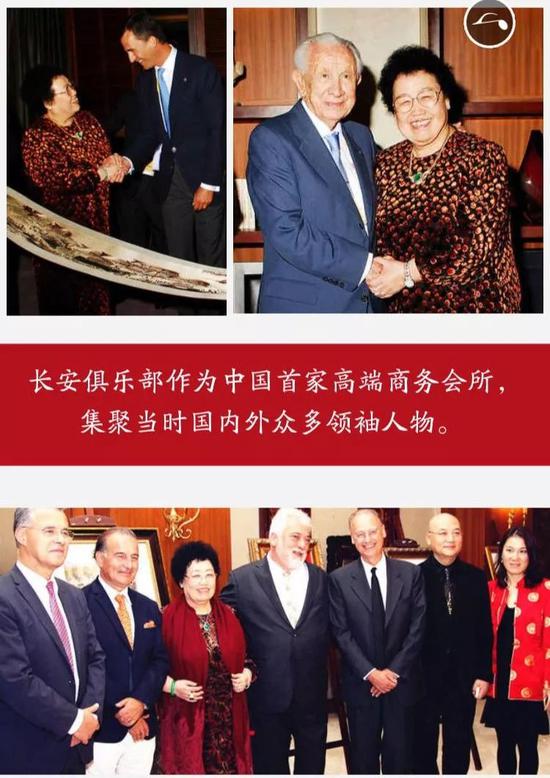
这家俱乐部低调而奢华,非会员不得参观,入会条件更是严苛。据《中国新闻周刊》报道,长安俱乐部的个人会籍会费目前是16.8万,每年的年费是1.6万,终身会籍会费为48万。长安俱乐部的会员甄选规则一是会员推荐,二是审核,并非是只要有钱就能进入。
而拿下金宝街改造项目,又是陈丽华的另一个大手笔之作。
西起王府井商圈的金鱼胡同,东至东二环雅宝路,南望长安街,北依朝阳门大街,全长730米,在其上可以俯瞰核心北京商业区王府井和中央商务区CBD。
On Jinbao Street, wealth flows like a stream. There are eight plots on both sides of the street, covering luxury hotels, Grade A office buildings, Beijing Hong Kong Jockey Club, Jinbaohui Shopping Center, luxury apartments and other high-end commercial properties. Jinbaohui Shopping Center has gathered many international brands such as GUCCI, Bottega Veneta and VERTU. Ferrari, Masalati, aston martin, Mercedes-Benz, Land Rover, Jaguar and other luxury car brands also have a place in the exhibition hall.
In June, 2018, Chen Lihua’s son Zhao Yong revealed that the street was still undergoing renovation, and it was really completed when the renovation was over.
Fuhua International Group’s wealth empire is still expanding. Founded in Hong Kong in 1988, Fuhua International has developed into a diversified multinational enterprise with high-end commercial real estate as its core and covering culture, art and finance in the past 30 years. At present, Fuhua’s commercial real estate investment projects in Beijing have been completed and under construction, covering an area of over 1.5 million square meters.
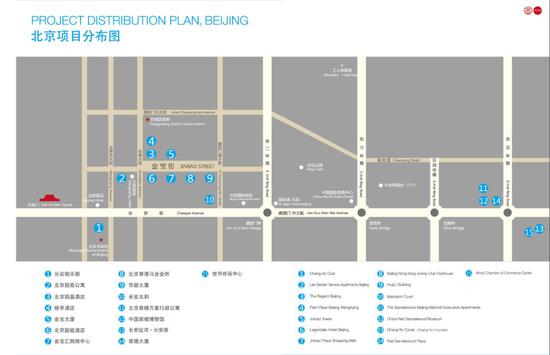
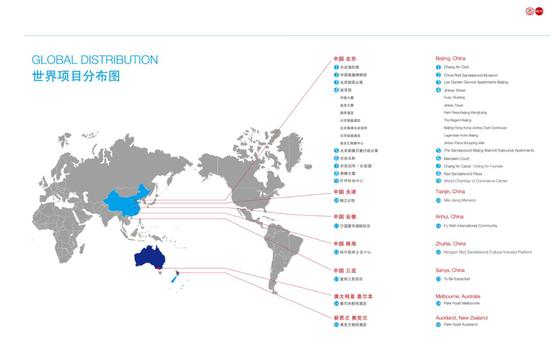
Since 2010, Fuhua has successively joined the construction and development of Beijing City Sub-center, Guangdong-Hong Kong-Macao Greater Bay Area Development and Construction, and Hainan Free Trade Zone, and invested in the construction of Zhuhai Hengqin rosewood museum. In 2014, Fuhua entered the international market and invested in hotels and other projects in Australia and New Zealand.
In May 2017, Fuhua International made its debut in the capital market, and its Beijing Fulihuade Biomedical Technology Co., Ltd. was listed on the New Third Board.
"Chasing" Tang Priest’s Rosewood Queen
Besides being extremely rich, Chen Lihua’s married life has also attracted much attention.
Zhongrui Chi was born in a family of Peking Opera. He played the Tang Priest in the CCTV version of The Journey to the West in 1986, and was a sensational national idol in that era. But then he faded out of the show business, married Chen Lihua in a low-key way, and assisted his wife’s business wholeheartedly.
In 1988, Chen Lihua and Zhongrui Chi met under the introduction of friends. Coincidentally, they both loved Peking Opera.
But Chen Lihua was 11 years older than Zhongrui Chi, divorced and had three children. At that time, she was 47 years old. In "An Appointment between Lu and Yu", she admitted that Zhongrui Chi was chased by herself. "Mr. Chi is so beautiful that many women queue up to chase him." In the 1980s, it took courage to do so. She had consulted her children for this, but they all supported her mother to find a partner.
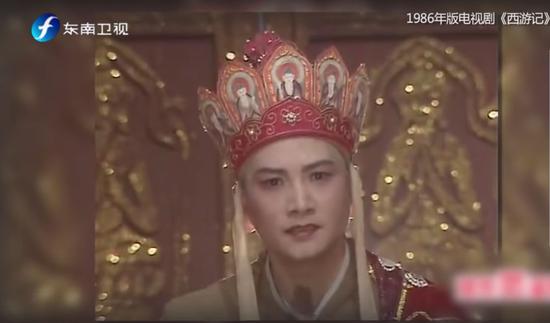
In 1990, the two finally came together. At that time, Chen Lihua was already the richest woman, with assets exceeding 100 million. They used to be controversial because of their age differences, and now they have been working together for 29 years.
After the marriage, the husband and wife treated each other as guests, and they called each other "Chairman" and "Mr. Chi". They all spoke with "you" and never joked. "With the chairman for 28 years, it seems that we have only been together for 10 years, and I feel that time has passed very quickly." Zhongrui Chi, who has gained some weight, said with a smile that he looks as slow, courteous and gentle as the Tang Priest.
Although there is a big age gap, Chen Lihua and Zhongrui Chi have found a common hobby and topic on rosewood.
Because of her love for rosewood, Chen Lihua is also known as the "rosewood queen". Since 2008, Chen Lihua has spent eight years restoring 16 old city gates of "nine inside and seven outside" in old Beijing with red sandalwood and dark wood in a scale of 1: 10, and 10 watchtowers are still being made. She devoted herself to studying rosewood carving for 40 years, just to make the old Beijing city gate "live".
Without sample paper, she and the workers were in the basement, kneeling on the ground and proofreading the drawings. Everyone was injured and her knees were scarred. She recalled that 40 years ago, she also went to the Indian jungle to buy red sandalwood. "Snakes and pythons are in groups, and the grass is deep. When the elephant pulls out, it can’t be seen."
In her factory, 77-year-old Chen Lihua introduced the Zhengyangmen model to Lu Yu. She jumped twice excitedly on the tower, bluntly saying that 100 people could stand on it, and every door and window could be opened and closed. The whole process was made without a nail. At that time, Zhongrui Chi silently hugged Chen Lihua behind her and gave her protection. While observing the red sandalwood carving, Zhongrui Chi reminded her to wear glasses, and when she was sweating, she put out her hand behind her to wipe her sweat.
As an old Beijinger and a descendant of Manchu Dynasty, Chen Lihua has a special complex for traditional culture. She laughed at herself and did this because "she can’t get over it." When her rosewood was copied from the work of the city gate, it could only be stored in the basement, and it was temporarily impossible to show it to the world. That kind of sadness was beyond words. She cried many times at home.
Chen Lihua’s life focus is now completely on rosewood. It will take her several years to go to the headquarters of Fuhua International Group in Jinbao Street. This company has now been left to her son Zhao Yong to take care of. On her latest visit, after greeting her son, she went straight to the rosewood furniture in the office and sighed at a scratch on it.
Chen Lihua admits that her living expenses are only in 10 yuan. Her favorite food is rice mixed with snow red. She doesn’t drink coffee or tea, and she doesn’t drink alcohol or tobacco. The only obsession is rosewood art, so she feels guilty for her children.
In 1999, Chen Lihua spent 200 million yuan to build the only rosewood museum in the world-"China rosewood museum" on the edge of the East Fifth Ring Road in Beijing, and invited Zhongrui Chi as the deputy curator. It is also considered as a gift from her to Zhongrui Chi.
Her restored old Beijing city gate was recognized by experts such as Shan Shiyuan, a consultant of the Palace Museum, and she got a special endorsement from the Palace Museum, "Any warehouse can enter and do as much as possible". Subsequently, Chen Lihua spent more than ten years trying to copy all the woodwork in the Forbidden City, and now 999 pieces of furniture displayed in the Red Sandalwood Museum are all original copies of the Forbidden City. She said, "Without the Forbidden City, there would be no today. The China Rosewood Museum is not mine, but the Forbidden City."
Chen Lihua and his wife now go to the rosewood factory on the outskirts of Beijing every morning to polish and carve rosewood works with workers. Chen Lihua personally supervised in the factory, and also carved the details of every African claw and leaf.
Chen Lihua said, "Although I am a businessman, all my funds should be left on this (red sandalwood) for the country. If I don’t do something in my life, it will be for nothing." Although investing in the rosewood museum costs a lot, just doing exhibitions and not selling them to the outside world is like a bottomless pit, but she thinks that "it is more meaningful than keeping money."
Chen Lihua, who has a bright and hearty nature, bluntly said that he is a man and loves to work. "It’s like plowing cattle all his life, pulling a cart and walking by himself, and I still feel very comfortable.".
It seems that the aura of a strong woman in Chen Lihua overshadowed that of Zhongrui Chi, but Zhongrui Chi also said in an interview before that, "I am not afraid of her strength, but I like this kind of strong woman very much". Zhongrui Chi and Chen Lihua’s three children also get along well. Three generations of their family have dinner and breakfast together every day. If Chen Lihua comes home late, everyone will wait for her to have dinner together and help her back to the sofa after dinner.
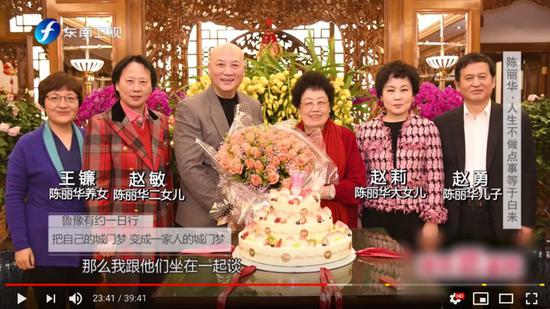
Chen Lihua hasn’t spoken out about the inheritance of wealth. According to Tianyancha data, there are 71 companies under the name of her eldest son Zhao Yong, who are in charge of core businesses such as Chang ‘an Club and real estate. The eldest daughter Zhao Li also has 14 companies under her name. In contrast, Zhongrui Chi’s performance in investment and business is mediocre, with only two companies as executives, both of which are related to rosewood technology.